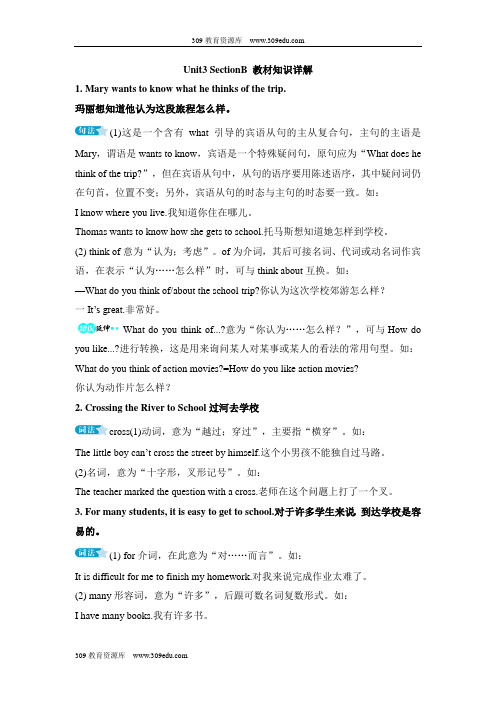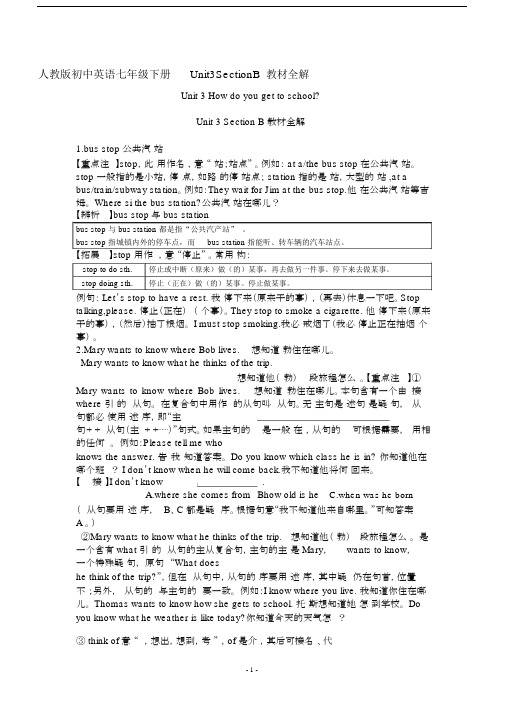【教材讲解配套】七年级英语人教版下册Unit3_SectionB(2a-2c)课后作业
- 格式:docx
- 大小:19.22 KB
- 文档页数:2





Unit3 SectionB 教材知识详解1. Mary wants to know what he thinks of the trip.玛丽想知道他认为这段旅程怎么样。
(1)这是一个含有what引导的宾语从句的主从复合句,主句的主语是Mary,谓语是wants to know,宾语是一个特殊疑问句,原句应为“What does he think of the trip?”,但在宾语从句中,从句的语序要用陈述语序,其中疑问词仍在句首,位置不变;另外,宾语从句的时态与主句的时态要一致。
如:I know where you live.我知道你住在哪儿。
Thomas wants to know how she gets to school.托马斯想知道她怎样到学校。
(2) think of意为“认为;考虑”。
of为介词,其后可接名词、代词或动名词作宾语,在表示“认为……怎么样”时,可与think about互换。
如:—What do you think of/about the school trip?你认为这次学校郊游怎么样?一It’s great.非常好。
What do you think of...?意为“你认为……怎么样?”,可与How do you like...?进行转换,这是用来询问某人对某事或某人的看法的常用句型。
如:What do you think of action movies?=How do you like action movies?你认为动作片怎么样?2. Crossing the River to School过河去学校cross(1)动词,意为“越过;穿过”,主要指“横穿”。
如:The little boy can’t cross the street by himself.这个小男孩不能独自过马路。
(2)名词,意为“十字形,叉形记号”。
如:The teacher marked the question with a cross.老师在这个问题上打了一个叉。

人教版初中英语七年级下册Unit3SectionB教材全解Unit 3 How do you get to school?Unit 3 Section B 教材全解1.bus stop 公共汽站【重点注】stop,此用作名,意“ 站;站点”。
例如: at a/the bus stop 在公共汽站。
stop 一般指的是小站,停点,如路的停站点; station 指的是站,大型的站 ,at abus/train/subway station。
例如:They wait for Jim at the bus stop.他在公共汽站等吉姆。
Where si the bus station?公共汽站在哪儿?【辨析】bus stop与 bus stationbus stop 与 bus station 都是指“公共汽产站”。
bus stop 指城镇内外的停车点,而bus station 指能听、转车辆的汽车站点。
【拓展】stop 用作,意“停止”。
常用构:stop to do sth.停止或中断(原来)做(的)某事,再去做另一件事。
停下来去做某事。
stop doing sth.停止(正在)做(的)某事。
停止做某事。
例句: Let’s stop to have a rest. 我停下来(原来干的事),(再去)休息一下吧。
Stoptalking,please.停止(正在)(个事)。
They stop to smoke a cigarette. 他停下来(原来干的事),(然后)抽了根烟。
I must stop smoking.我必戒烟了(我必停止正在抽烟个事)。
2.Mary wants to know where Bob lives. 想知道勃住在哪儿。
Mary wants to know what he thinks of the trip.想知道他(勃)段旅程怎么。
【重点注】①Mary wants to know where Bob lives. 想知道勃住在哪儿。




Unit3 SectionB〔2a-2c〕名师教案1.1 Teaching objectives 教学目标1.1.1 Language targets 语言目标1.1.1.1 Key Words and Chunks1.1.1.1.1 For applying: cross, leave, river, village, bridge, year, dream, many, afraid, true, between, like, between…and…, come true1.1.1.1.2 For comprehending: ropeway, villager, Dave1.1.1.2 Sentence Structures1) How do you get to school?2) For many students, it is easy to get to school.3) There is a very big river between their school and the village.4) There is no bridge and the river runs too quickly for boats .5) One 11-year-old boy, Liangliang, crosses the river every school day .6) But he is not afraid.7) He is like a father to me.8) It is their dream to have a bridge.9) Can their dream come true?10) Why do they go to school like this?1.1.1.3 Grammar Focus1) For many students, it is easy to get to school. 〔It is + adj. +for sb. + to do sth. 对于某人来说,做某件事是怎样的。
Unit 3 第四课时课后作业
一、请根据汉语提示,完成句子。
1. In Beijing, lots of people love to (乘地铁) to work.
2. (有一座桥) over the river.
3. Mary is a (10岁的女孩).
4. I go to school either (步行) or (骑自行车).
5. It's dangerous (游泳) in the river.
6. It is their(梦想)to .(拥有一座桥)
二、阅读理解。
My name is John and I am a doctor. I live in Beijing with my family. I have a brother and he is Alan. He studies in No. 1 Middle School.
Alan wants me to buy a bike for him. I ask him why. He says, “The school is far away from our home. I don't like to walk to school, because it takes me a lot of time. It is not good for the environment (环境) to go to school by car. Riding a bike is a kind of sport. I think it is good for me. Can you help me?”
“Sure! You're right.” I will buy him a new bike, then he will be able to ride the new bike to school every day.
( ) 1. Where does the family live?
A. In Shanghai.
B. In Beijing.
C. In Tianjin.
D. In Nanjing.
( ) 2. What does John do?
A. A student.
B. A teacher.
C. A doctor.
D. A driver.
( ) 3.What does Alan think of walking to school?
A. It's good for him.
B. It's not good for the environment.
C. It’s a kind of sport.
D. It takes a lot of time.
( ) 4. Alan will go to school ______.
A. by bus
B. by car
C. on foot
D. by bike
( ) 5. From the passage we know that .
A. Alan wants to protect the environment
B. John lives with his friend
C. John doesn't want to buy a bike for Alan
D. Alan is lazy
参考答案:
一.
1.take the subway;
2. There is a bridge;
3. 10-year-old girl;
4. on foot, by bike;
5. to swim;
6. dream, have a bridge
二.
1.B
2.C
3.D
4.D
5.A。